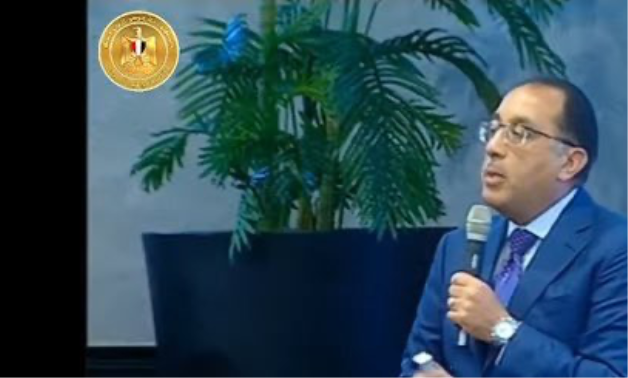
Egypt's Prime Minister Mostafa Madbouli at the Press Conference
CAIRO - 15 May 2022: Egypt will implement measures to deal with the global economic crisis, including strengthening the role of the private sector and announcing a program for the private sector partnership in state-owned assets at a value of LE 10 billion annually, according to Prime Minister Mostafa Madbouli.
During his speech on the sidelines of the World Conference of the Egyptian Government, the Prime Minister said that the import bill for wheat and oil rose by $6.2 billion after the Ukraine crisis.
Egypt Today monitors the most prominent points of Madbouli's statements during the press conference:
-
Egypt will achieve a primary surplus of no less than 2.1 percent
-
Egypt is still in the high bracket of public debt and the government aims to reduce it to 75 percent
-
Egypt is the first country to issue green bonds, and Islamic Sukuk are scheduled to be issued.
-
The state is fully aware of the size of the challenges in the stock market
-
21 measures were implemented to attract new investors to the Egyptian Stock Exchange
-
The government aims to reduce the budget deficit to 6.2 percent in 2022/2023
-
Companies affiliated with the Egyptian army will be listed on the stock exchange
-
Government hotels will be merged under the name of one company and listed on the stock exchange
-
Offering percentages of national projects, such as the electric train, to the private sector, with giving them the right to manage the projects.
-
LE 130 billion in 2022/2023’s budget to face the repercussions of the Russian-Ukrainian crisis
-
For the first time, Egypt expects to produce 10 million tons of wheat
-
LE 36 billion, the cost of increasing wheat supply prices and increasing prices globally
-
Egypt has 5.5 million tons of wheat storage capacity, compared to 1.5 before 2014
-
The strategic reserve of commodities is sufficient for a period of no less than 4 months
-
Egypt will not have a wheat crisis until the end of 2022
-
Egypt has an oil reserve of 6 months
-
71 million citizens benefit from subsidized bread
-
The state subsidize a ton of agricultural fertilizers with LE 10,000 per ton
-
Logistical areas will be expanded throughout the republic
-
-Adding 450 thousand Families to the Takaful and Karama program
-
10 million citizens benefit from pensions
-
Global trade losses are close to $300 billion, and debt worldwide has increased by 350 percent
-
The global economy loss from the current crisis amounts to $12 trillion.
-
The government is implementing a plan to reduce debt, revitalize the stock exchange, and social protection
-
The population increase that Egypt is witnessing requires the creation of one million job opportunities annually
-
The state intervened to pump government investments to compensate for the decline in private sector investments as a result of the conditions it has gone through since 2011.
-
National projects and infrastructure investment were necessary, and Egypt became the first in Africa in Internet speed
-
The new cities accommodate 10 million Egyptian citizens
-
Had it not been for the economic reform programs and economic development programs that Egypt witnessed before the crisis, the Egyptian economy would not have been able to withstand these crises
-
Expectations that a fifth of the Earth's population may fall into poverty as a result of the current global crisis
-
The size of the world's public debt has increased to $303 trillion
-
Global inflation has reached 9 percent, an unprecedented number worldwide
-
The government puts in our scenarios that the global crisis may be prolonged, and what is happening in Egypt is not a local problem, but it is the result of a global crisis
-
Before the Russian-Ukrainian crisis, Egypt achieved a growth rate of 9 percent
-
Last year, Egypt witnessed the highest rate of exports in the country's history
-
Suez Canal revenues recorded an unprecedented increase
-
LE 130 billion represents the direct impact of the crisis on the Egyptian economy, LE 335 billion represents the indirect impact.
-
The Russian crisis causes foreign capital to flee
-
31 percent of the tourism to Egypt are from Russia and Ukraine, and the government are looking for alternative markets
-
The government has strengthened social protection programs to ease the impact of the Russian crisis on the citizen
-
A unified plan to counter the increase in public debt will be announced
-
President Sisi directed to enhance the role of the private sector and support the national industry
-
The labor market attracts one million young people annually
-
The population of Egypt is equivalent to 15 European countries and 14 Arab countries
-
The government will exit from certain sectors within the next 3 years
-
Egypt aims to raise the participation of the private sector to 65 percent during the three years
Comments
Leave a Comment